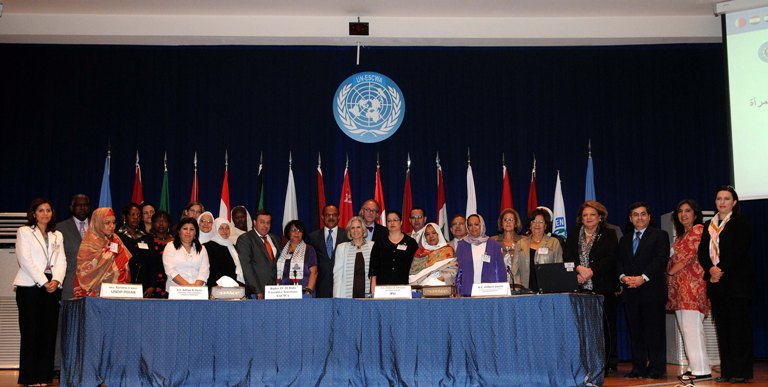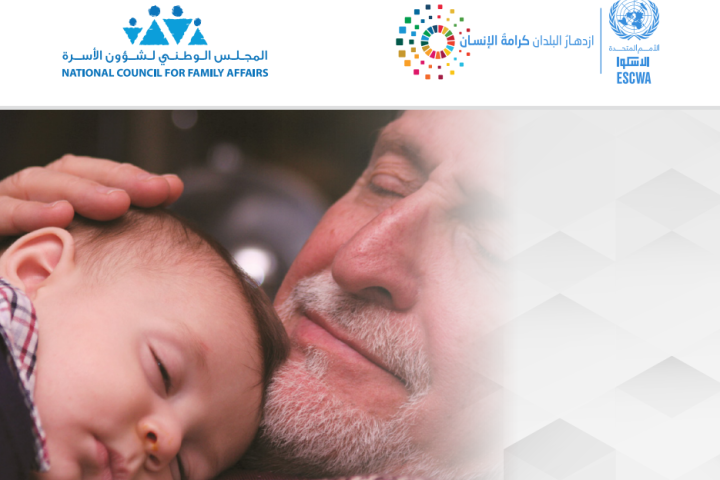The Economic and Social Commission for Western Asia (ESCWA) opened today a regional workshop for Arab parliaments on implementing the Convention on the Elimination of All Forms of Discrimination against Women (CEDAW) and ending violence against them. This workshop is held at the UN-House Beirut, and organized by ESCWA in cooperation with the Inter-Parliamentary Union (IPU), the Lebanese Parliament and the United Nations Development Programme-Parliamentary Development Initiative in the Arab Region (UNDP-PDIAR).
Participants in the opening session were MP Gilbert Zouein, representing the Lebanese House Speaker Nabih Berri, Anders B. Johnsson, Secretary General of the Inter-Parliamentary Union, José Mendes Bota, Chairperson of the Committee on Equal Opportunities for Women and Men, Parliamentary Assembly of the Council of Europe, Karima El Korri, Programme Coordinator of UNDP-PDIAR, MP Bahia El Hariri, Badr Omar AlDafa, ESCWA Executive Secretary, in addition to members of parliaments and parliamentary staff from all 14 Arab member countries of ESCWA, as well as Arab and international experts.
In his speech, AlDafa pointed that a large number of ESCWA Member Countries adjusted some laws that do not comply with CEDAW, “concerning the nationality, work, stand for parliamentary elections, family and criminal laws, and these countries are Algeria, Morocco, Jordan, Juwait, Lebanon and Syria”. He also noted the existing cooperation between ESCWA and several international bodies, such as the IPU, UN Women, to organize a series of workshops for parliamentarians and members of Shura Councils in order to strengthen the efforts of amending the national legislations in the Arab region in line with CEDAW.
For her part, Zouein urged the need to apply this convention, indicating the importance of exchanging experience among Arab countries to overcome the difficulties facing the process of modernization and change. Zouein informed the participants that the draft law on “Protecting Women from Domestic Violence in Lebanon” was finalized and has been included on the agenda of the Lebanese Parliament for approval in the near future.
Delivering the opening statement, Johnsson discussed the campaign launched by IPU in cooperation with UN organizations to support parliaments in their efforts to end violence against women. He explained that this campaign aimed to build an effective legal framework, secure the implementation of this legislation, and reinforcing awareness of violence against women. Johnsson also indicated that the world average of women in parliaments is 19 per cent, while 15 years ago, it was 11.3 per cent. He added that this progress is so slow so that this ratio will not exceed 30 per cent in 2025.
In her statement, El Korri emphasized that parliaments were playing an important role in monitoring the implementation of CEDAW and holding governments accountable for reporting to the concerned committee, “but several factors prevent the parliaments from implementing their roles, when, for instance, the governments take decisions without going back to legislative bodies during the development of strategies and their implementations and also during the preparation and review of the reports that highlight the success and challenges in achieving gender equality and women empowerment”.
Delivering a keynote speech on “Discrimination Against Women and Violence Against Women”. Bota presented a European case study explaining how the action of the Council of Europe in relation to combating violence against women is linked to the elimination of all forms of discrimination against women. He pointed that across the continent of Europe as a whole, the violation of human rights can be said to affect almost 80 million women. “This prompted the Heads of State and Government of Council of Europe member states to launch a campaign called “Stop domestic violence against women” from 2006 to 2008”, he added. This campaign aimed to draft a new legally binding convention, which will be issued at the end of 2010, on preventing and combating violence against women and domestic violence. Bota stressed the need to work on the establishment of gender-balanced societies, starting in the political and public life. He concluded by pointing that “more efforts are required and a strong political will is needed at European and national levels to introduce measures to achieve real gender equality and tackle the roots of violence against women”.
The workshop will last until 29 July and it aims to inform participants about the contents and monitoring body of CEDAW. It seeks to highlight the role of parliaments in the reporting process to the UN Committee on the Elimination of All Forms of Discrimination against Women. The Workshop will also assess progress made and address remaining challenges. It will help identify parliamentary mechanisms and means to ensure and oversee the effective implementation of CEDAW at the national level and key actions that parliaments and their members can take to contribute to the process.
The Workshop will help to analyze how violence against women is addressed by the national legal frameworks in the region. It will identify existing gaps and recommend practical measures to ensure that national legislations conform to CEDAW and prevent violence against women, and that they penalize it and provide effective protection to victims.
The topics to be discussed at the workshop are: CEDAW: content and monitoring body; Arab States and CEDAW: achievements and challenges; the role of parliaments in implementing CEDAW; legal international frameworks and violence against women; forms of violence against women in the Arab world; legislation to combat violence against women; parliamentary experiences from the region and abroad; and key follow-up actions for parliaments and their members.




